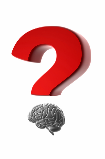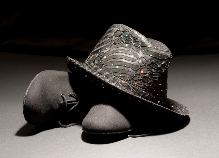
Perfect Knowledge in Question
NOTE: Not yet fully proofed for errors and clarity.
Oct. 23, 2016, John Æonid
The branch of Philosophy that addresses the basic notions of how we can know anything at all is called Epistemology. Anywhere you see me throwing around that word or associated words, I am attending to a sense of responsibility, one in which I better understand what kind of knowledge I'm working with. And, knowing where my knowledge is coming from, helps me understand how to best apply it. It also helps those who are scrutinizing my words to understand what level of quality and applicability I am attributing to those words. Ultimately, I don't want to go out on a limb on important topics; and for topics where I'm willing to go out on a limb, I may want to start of with: "Hey, I may be going out on a limb here, but…".
There are a number of different perspectives on how we can know a thing. One very important perspective is that if Empiricism, without which Technology and Science would not be where they are today. Empiricism restricts itself to knowledge of the physical world to that which can be gathered by way of the senses. That doesn't cover all that we experience, but it has amassed a wealth of practical knowledge, which allows us to manufacture the advanced technology that we now use on a daily basis. It has also eradicated diseases and given us tools to live healthier lives (though, admittedly not always in the wisest ways). Science and Technology would not be as far along as it is if it hadn't been very clear on how to acquire the highest quality of knowledge.
There are other perspectives as well. Logic and Mathematics must both ensure that there are no internal conflicts. That is, various ideas within these systems can't disagree, resulting in a contradiction. Because internal coherence is lost when a contradiction is present, it becomes incoherent.
But, Logic and Mathematics work only with ideas or ideas about other things, and the quality of applied logic and mathematics is utterly dependent upon the descriptive quality of the ideas in use. And, if the ideas in use do not reasonably correspond to reality, then neither will any logic or mathematics using those ideas. Einstein said: “As far as the laws of mathematics refer to reality, they are not certain; and as far as they are certain, they do not refer to reality.” So, Logic and Mathematics are regarded as perfect, nearly perfect, as far as they are internally coherent; but like a modern computer, they need accurate and meaningful input to produce accurate and meaningful results. Otherwise, garbage in; garbage out.
So, that defines a few concepts, as well as hints at some of the issues involved. And, that gets us to the primary question here: is there really such a thing as perfect knowledge? And, if you are willing to question absolutely everything, then don't you feel at least a bit inclined to say "no"?
So, what about Faith? Well, I've spent time exploring some of the problems involving Faith, including its use as a kind of bondage, and whether it is possible to live entirely without Faith (not yet written). So, if you are one who questions, then which is it? Are you one who would do better with no manner of Faith? Or, would you find that there is a kind of Faith that serves you, without overreaching, and does not enslave you? And, to avoid a false dichotomy, I'll add that perhaps you are one who would chose to retain your current concept of Faith. But, for those who want to look deeper, these are difficult questions.
So, it just happens that Epistemology includes an even more prominent perspective, primarily because of a particular cultural conflict. This is the one that results in fierce divisions between Spiritual and Scientific factions. This is Skepticism. But, not just any kind of Skepticism, the most prominent form of Skepticism is Scientific Skepticism. And, this is also a social movement, seeking to reduce the harm done by bad science, yet also targeting the manner of thinking that they believe leads to that harm. Those of you in Spiritual practice that adhere to a high ethical standard may feel frustrated that this often includes you. But, do recognize that you have a common enemy—those who deliberately misrepresent their product. The really honest spiritual practitioners strive to ensure that a client or customer does not overestimate the product—particularly when health and well being are a stake.
Within Skepticism, the other major but less prominent branch is Philosophical Skepticism. And, within this, there are many different kinds of Skepticism. Consider the extreme, as per Wikipedia: “Radical skepticism ends in the paradoxical claim that one cannot know anything—including that one cannot know about knowing anything.”
So what is the major thrust of all this? How we know anything at all is not such a simple thing, and asking questions to find out where an idea came from is important. There are things to learn, yes? There is a good chance that there is no such thing as perfect knowledge. Or at least, the finite space of the human brain hasn't the capacity for perfect knowledge. We can speculate about perfect knowledge, possibly something that a perfect God or Goddess might have. But, that's speculation, and thus inherently imperfect. It's not that you can't work with such knowledge. But, the better you know the limits, the better that you'll be able to apply the knowledge accurately and safely.
Ultimately, we question to learn. And, seeking to also know the source and quality of knowledge greatly enhances that learning. Because Science and Technology were clear in their declaration of what constituted valid knowledge, we now have amazing technology, an amazing means to maintaining health, and an enormous knowledge of the physical Universe. And, it is the Skepticism built into the Scientific Method that allows Science to maintain the level of quality that we have come to know.
Historically, the acquisition of Scientific knowledge suffered restrictions as imposed by the Church. And today, some established religions are at odds with Science over Evolution (Denialism). But, I don't see a reason to respect institutions on which there is still a dark shadow of tyranny, especially when many, myself included, find their limited perspective to be so very unfulfilling Spiritually. I find it much more comfortable and safer for my sanity to respect the findings of Science and leave the rest to more abstract realms that are not under the shadow of institutional tyranny.
I know there is a lot of discomfort and strong opinion around these subjects. Those who are genuinely on a Spiritual path are striving to bring something of divine quality into our lives, and we expect that there are times when the criticism doesn't feel good. And, there may be areas where it seems to get in the way of that progress, but I think you know that the obstacles are indicators of work that has yet to be done. Remember, not all obstacles are meant to be torn down; many represent skills and knowledge that will be needed farther down the path.
Perhaps my biggest concern is that there is a pressure to believe. This is not a concern about the institutional pressure to believe. I think there's a culture impression that a thing has to be real in every way to be valuable. But, not everything that is valuable is real in the same way. And, some of things that are valuable are abstract, so they have no physical reality.
Think of wonder; it is one of the greatest gifts of life. The fact that we have the imagination to recognize that there are things beyond our knowledge is also one of the great gifts of life. These are abstract things; but in a particular sense, they are real. There are many levels of manifestation that are all beyond physical reality. They can be difficult to grasp, but it is more important to understand them for what they provide us. Believing they are in this physical realm is just not necessary. And, I think it will limit you to think that such a degree of belief is necessary. It is better to know what is useful and meaningful than to have to believe that it has the same status as physical reality.
Ultimately, I think we should allow that there is more to learn--that a particular bit of knowledge is not mastery in simply knowing it—but that mastery is knowledge of all the ways in which that knowledge is applicable, as well has how to wield it. And, while free speech is a wonderful thing, genuinely Spiritual people would deeply regret it if a belief that was not used correctly were to do harm.
In addition to all this, belief is always divisive. That is, when you have a belief, there is always an implied disbelief in opposition to contrasting notions. And, strangely enough, there are places where two seemingly solid ideas don't quite fit together and are at odds together. In Religious circles, these are called paradoxes. In other places these are called problems, meaning who don't yet have a good explanation for how the two things co-exist. For example, there the Mind-Body Problem. But, we don't make progress if we don't keep asking questions. And, if we settle on a belief without continuing to strive to understand it's nature, we end up in stagnation and not progress. And, that includes examining any justification we think we have for being unquestioningly against what doesn't agree with our beliefs.
And with that, a tip of the hat to Byron Katie, whose self-help work bears a striking resemblance to Stoicism, in which she shows us her method for questioning our thinking and Loving What Is. In summary, she focuses on questioning all thinking that is at odds with things that are well beyond our individual means to change. That includes the physical world, the destructive nature of bad thinking in others, and even those that we are involved with—because it's not our job to force change upon others. Instead, the thinking we are most free to change is our beliefs about how things should be, as that is the thinking that puts us at odds with reality and results in our suffering.
And, one final point for this odds and ends section: When looking at all the debates that arise around these topics, Skepticism, Science, Spirituality, I realize that the younger we are, or perhaps the more limited our knowledge (NPR article, maybe) and range of experience, the more we are attached to a particular definition of a thing. However, for every aspect of life there are many perspectives. Some are subtle and some are not. But, it takes experience and breadth of knowledge to know when you are debating from a limited point of view.
So, I am someone who dwells firmly in both realms. When I engage in Spiritual practices, I am there for the quality of the experience and the enrichment it brings me. My Spiritual experiences are meaningful, regardless of whether they have Scientific proof to back them up. I am not doing these things to flout Science, or to deny anything that has been proven by Science. In fact, I find wonderfully enriching things in Science, Physics, and Mathematics, even though I limit myself to the rules of Science when I am focusing on that realm. But, there are limits to Science, and I don't intend to deprive myself of a meaningful Spiritual life simply because Science can't fully explain all aspects of my life experience.
To be clear, I want to list, briefly, my two guidelines/rules for balancing participation in the two realms:
- What Science has shown is measured according to the quality of the body of evidence and the quality of the interpretation of that evidence. Science does make mistakes and warrants a fair amount of critical thinking, which is built into the Scientific Method, but that is not justification to be resistant to the evidence just because it doesn't feel good or contradicts a Religious doctrine. What Science has not disproved is open to some degree of Spiritual exploration (see #2).
- I do not have to express my Spirituality as obligatory belief or faith. Instead, I engage, as fully as possible, with the experience, with the intent to gain a meaningful and enriching understanding about my own personal inner nature and my connectedness to others. And, I feel no need to explain my own inner experience in terms of Science, unless of course, we are talking about what is widely accepted in Science (see #1). The enriching experience is everything that I need in the Spiritual realm.
There are limits to knowledge, and the best way to deal with it is to be questioning. Again, this is how we come to understand: what the source is, the measure of its quality, and the limits on how it can be applied. It's not wrong to be the right kind of skeptic, and it's not necessary for belief to be absolute or perfect. If everything were known there would be nothing left to learn—or to experience.
My current arrangement of Epistemological realms is a trinity. First is the realm of Logic and Mathematics, then there is the realm of Empiricism and Science, and thirdly there is the realm of the experiences of emotion and connection that give our lives meaning. That last one includes the arts, culture, social connectedness, as well as more Spiritual understandings. And, these three realms are interconnected in that each realm informs the others. There is room in each of these realms for some appropriately matched form of skepticism. And, that is the form that most productively serves the questioning, in that it tells us what needs work and what direction our inquiry might best move.
Finally, questioning is important, as well as understanding what it means to have perfect knowledge—if it's at all possible. But, there is the question of what is unknowable. That is, are there things in existence that about which we cannot have any manner of knowledge? And for that, I plan to write a commentary on The Five Abysses as described by Terrance McKenna.


